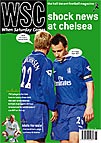 Democracy comes to football in differing forms
Democracy comes to football in differing forms
So, democracy comes to football. Luton Town’s decision to elect their new manager, referred to in WSC 197, produced a most unexpected result in late June with Mike Newell apparently beating Joe Kinnear to the job by just four votes. Meanwhile in Spain, Barcelona fans enthusiastically voted in Joan Laporta as new club president on the back of his pledge to sign David Beckham and four other players.
Like Newell, Laporta was a rank outsider when campaigning began, with just 2.2 per cent support among Barcelona’s 100,000 voters (the Pope is a club member but is believed to have abstained). How embarrassing then for the new president to see Beckham subsequently depart to Barcelona’s sworn enemies for several million less than they had been prepared to pay.
That said, no one is questioning Laporta’s credentials as a Barcelona fan given that he previously lead an independent supporters group, Elefant Blau, that sought advice from fans groups in the UK during a long campaign to oust the dictatorial Josep Lluis Nuñez, who ran Barcelona for over 20 years until passing it on to his henchman Joan Gaspart in 2000.
The most fundamental difference between the elections at the Nou Camp and Kenilworth Road was that Barcelona fans were taking part in a carefully formulated election with a clearly defined set of voters, rather than in a hastily cobbled together PR exercise designed largely to mask (ineffectively) an appalling recent record of botched decision making.
Barcelona fans had real power and were exercising it on the right issue: who will run the club, not who will run the team. It is a common complaint in the game that those at the top escape responsibility – the manager always gets the blame, rather than the men who appoint him. Luton’s directors have taken this a stage further by palming off some of the responsibility for the appointment of Newell on to that amorphous body, the general public, perhaps even including Watford fans.
The Barcelona or Real Madrid model of the sporting club owned by the fans is sadly alien to English football and will largely stay that way. But even the biggest clubs could benefit from offering a greater degree of democracy. Football membership schemes are largely a way of parting fans from their money, with anti-hooligan measures tacked on, rather than an attempt to cement and improve the relationship.
With a bit of thought and imagination, much more could be achieved. Leicester could have avoided having to swap the ludicrous Walkers Bowl for the at least sensible Walkers Stadium, and maybe even built in some insurance against the possibility of that sponsorship ever ending if, as a matter of course, such decisions were taken by the club members.
The lack of a defined constituency turned Manchester City’s stand-naming vote into a farce about the Bell End, but the principle was a sound one. How many Aston Villa fans would vote to have their stand named after the chairman? Kit design, too, is an issue of which far too often clubs make a mess. Above all, the chance to vote for a fans’ representative or delegate who would, if not sit on the board, at least meet with the directors regularly.
Of course many of these initiatives are in place – ironically Luton had a fan/director who honorably resigned after the descent into chaos following the sackings of Kinnear and Newell. But if membership schemes were more widespread and had worthwhile, generally recognised benefits, then more fans would join them. Even without surrendering the real power to which their shareholding and status legally entitles them, directors could avoid the sort of mistakes which led to the Newell election in the first place.
And since directors are so interested in money, it is worth adding that it would be a way to sign up the millions who never leave the comfort of their armchairs yet count themselves as fans of this or that club. County cricket clubs retain members who rarely go to games but pay their subscription because they are given a sense of belonging. Cricket clubs are closer to the Barcelona model, of course, with the power to vote for the committees which run them, so the system is not alien to this country and also is not entirely irrelevant. Should football clubs fall on hard times and need reconstituting, then it could yet provide a basis on which to begin afresh.
Supporters often slip into referring to their club as “we”; why not make that a reality?
From WSC 198 August 2003. What was happening this month